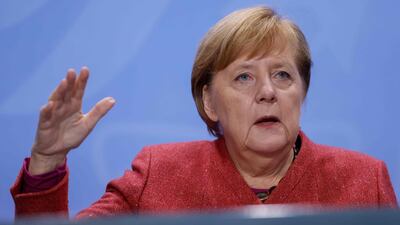Chancellor Angela Merkel on Friday urged the conservative Christian Democrats to remain a centrist party, signalling her rejection of nemesis Friedrich Merz, who is the front-runner for the post of party chairman.
The CDU will elect a new leader on Saturday in an important vote that could define what the party will look like in a post-Merkel era.
"As a people's party of the centre, we naturally seek solutions that balance out conflicts and always promote ... social cohesion," Ms Merkel told delegates at the opening of an online conference to pick the party's next leader.
"This has always distinguished us as a governing party," she said.
Three men are vying for the job: North Rhine-Westphalia state premier Armin Laschet, old Merkel rival Merz and foreign affairs expert Norbert Roettggen.

Mr Merz has campaigned on a promise to shift the party to the right, writing in a column for Der Spiegel that a "happy 'carry on like this' is just as inappropriate as the vague claim to occupy the centre at all times".
Mr Laschet and Mr Roettgen are expected to continue with Ms Merkel's more moderate centrist course.
Giving a further hint of her choice, Ms Merkel said she hoped that "a team will be elected that will take the fate of our proud party in its hands."
While she did not name names, the call appeared to be indicating support for Mr Laschet, who has campaigned on a joint ticket with Health Minister Jens Spahn as his deputy.
Ms Merkel had previously said Mr Laschet "has the tools" to be chancellor.
Ms Merkel, elected as Germany's youngest and first female chancellor in 2005, is planning to stand down after four terms and 16 years in the job following a general election in September.
She had already given up her position as the party's chair in 2018 but her preferred successor Annegret Kramp-Karrenbauer was forced to step down over her handling of a regional election scandal.
The head of the CDU traditionally leads the party into a general election as its chancellor candidate, meaning the winner of Saturday's vote would be in with a good chance of securing the top job.
Ms Merkel's cautious style of consensus politics has granted her lasting popularity in a wealthy, ageing nation that tends to favour continuity over change.
She helped Germany weather storms including the global financial crisis and eurozone turmoil as she shifted the CDU firmly to the political centre.


